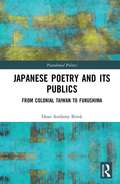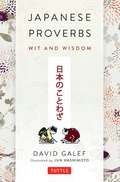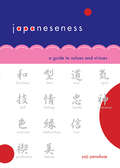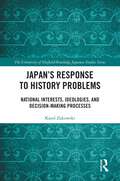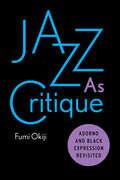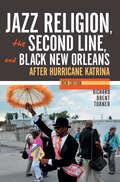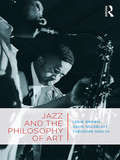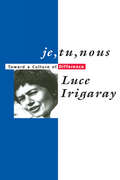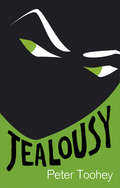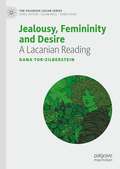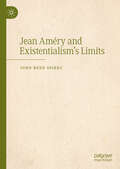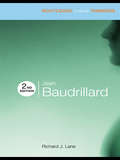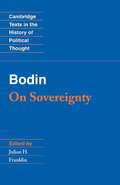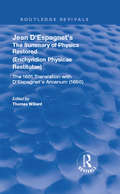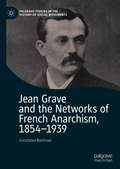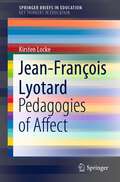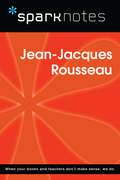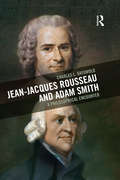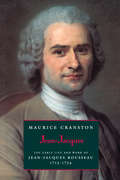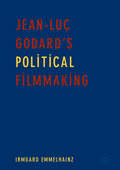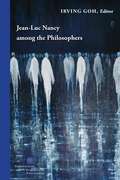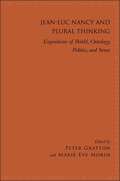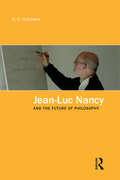- Table View
- List View
Japanese Poetry and its Publics: From Colonial Taiwan to Fukushima (Postcolonial Politics)
by Dean Anthony BrinkThis book aims to explore precisely how modern Japanese poetry has remained central to public life in both Japan and its former colony of Taiwan. Though classical Japanese poetry has captivated the imagination of Asian studies scholars, little research has been conducted to explore its role in public life as a discourse influential in defining both the modern Japanese empire and contemporary postcolonial negotiations of identity. This book shows how highly visible poetry in regular newspaper columns and blogs have in various historical situations in Japan and colonial Taiwan contested as well as promoted diverse colonial imaginaries. This poetry reflects both contemporary life and traditional poetics with few counterpoints in Western media. Methodologically, this book offers a defense of the public influence of poetry, each chapter enlisting a wide range of social and media theorists from Japan, Europe, and North America to explore specific historical moments in an original recasting of intertextuality as a vital feature of active inter-evental material engagements. In this book, rather than recite a standard survey of literary movements and key poets, the approach taken is to examine uses of poetry shown not only to support colonialism and imperialism, emerging objectionable forms of exploitation as well as the destruction of ecologies (including old-growth forests in Taiwan and the Fukushima Disaster), but also to present a medium of resistance, a minor literature for registering protest, forming transnational affiliations, and promoting grass-roots democracy. The book is based on years of research and fieldwork partially in conjunction with the production of a documentary film, Horizons of the Rising Sun: Postcolonial Nostalgia and Politics in the Taiwan Tanka Association Today (2017).
Japanese Proverbs
by David Galef Jun Hashimoto"Destroy a nation, but its mountains and rivers remain."--Japanese proverbThis is a collection of 200 Japanese proverbs with illustrations and explanations for each saying.Go beyond speaking Japanese-peek into the soul of Japan. Japanese Proverbs: Wit and Wisdom is a delightfully illustrated compilation of traditional Japanese proverbs and sayings. Some of the classic Japanese quotes and quotations, like "Fall down seven times, get up eight", capture the dogged perseverance of the Japanese heart. Others, such as "A red lacquer dish needs no decoration" illuminate both a universal truth and Japan's unique, aesthetic traditions. Japanese Proverbs: Wit and Wisdom has proverbs of great cultural significance as well as proverbs on matters of daily life and customs.Pleasing to expert and new-comer alike, the 200 traditional proverbs in this unique collection are presented in Japanese script (kana and kanji) and romanized (romaji) form, along with direct English translations. Similar proverbs are given from English, and the sumi-e style ink drawings are a delight in their own right.You'll speak Japanese with the verve and nuance of a native when you use these apt and witty expressions.
Japanese Proverbs
by David Galef Jun Hashimoto"Destroy a nation, but its mountains and rivers remain."--Japanese proverbThis is a collection of 200 Japanese proverbs with illustrations and explanations for each saying.Go beyond speaking Japanese-peek into the soul of Japan. Japanese Proverbs: Wit and Wisdom is a delightfully illustrated compilation of traditional Japanese proverbs and sayings. Some of the classic Japanese quotes and quotations, like "Fall down seven times, get up eight", capture the dogged perseverance of the Japanese heart. Others, such as "A red lacquer dish needs no decoration" illuminate both a universal truth and Japan's unique, aesthetic traditions. Japanese Proverbs: Wit and Wisdom has proverbs of great cultural significance as well as proverbs on matters of daily life and customs.Pleasing to expert and new-comer alike, the 200 traditional proverbs in this unique collection are presented in Japanese script (kana and kanji) and romanized (romaji) form, along with direct English translations. Similar proverbs are given from English, and the sumi-e style ink drawings are a delight in their own right.You'll speak Japanese with the verve and nuance of a native when you use these apt and witty expressions.
Japanese Proverbs
by David Galef Jun Hashimoto"Destroy a nation, but its mountains and rivers remain."--Japanese proverbThis is a collection of 200 Japanese proverbs with illustrations and explanations for each saying.Go beyond speaking Japanese-peek into the soul of Japan. Japanese Proverbs: Wit and Wisdom is a delightfully illustrated compilation of traditional Japanese proverbs and sayings. Some of the classic Japanese quotes and quotations, like "Fall down seven times, get up eight", capture the dogged perseverance of the Japanese heart. Others, such as "A red lacquer dish needs no decoration" illuminate both a universal truth and Japan's unique, aesthetic traditions. Japanese Proverbs: Wit and Wisdom has proverbs of great cultural significance as well as proverbs on matters of daily life and customs.Pleasing to expert and new-comer alike, the 200 traditional proverbs in this unique collection are presented in Japanese script (kana and kanji) and romanized (romaji) form, along with direct English translations. Similar proverbs are given from English, and the sumi-e style ink drawings are a delight in their own right.You'll speak Japanese with the verve and nuance of a native when you use these apt and witty expressions.
Japaneseness: A Guide to Values and Virtues
by Yoji YamakuseThis book looks at the core life concepts and shared values that historically and culturally define the quality of "being Japanese. " Among these are reverence, love of nature, group loyalty, hierarchical respect, passion for detail, belief in learning, formality, and acceptance of change. How can Western analogues of these Japanese virtues help us improve our own societies and cultivate inner strength, mindfulness, and long-lasting relationships at home and the workplace? This stimulating exploration of an alternative ethics and humanism is a provocative workbook for "decluttering the spirit. " Yoji Yamakuse is a Tokyo-based consultant on personnel management, staff training, and development of joint projects in cross-cultural environments.
Japan’s Response to History Problems: National Interests, Ideologies, and Decision-Making Processes (The University of Sheffield/Routledge Japanese Studies Series)
by Karol ZakowskiThis book examines the decision-making processes behind the formulation and evolution of the Japanese government’s official stance regarding diplomatic problems connected with the history of Japan’s territorial expansionism in East Asia.Based on neoclassical realism and historical institutionalism, this book analyzes to what extent Japan’s reaction to history problems complied with external pressures and to what extent it was modified by domestic-level variables. Particular attention is paid to the ideological leanings of key decision makers as well as their position against veto players, such as ruling party decision-making bodies, Liberal Democratic Party (LDP) factions, cabinet members, coalition parties, and ministerial bureaucrats. Through four case studies – apologies for the war of aggression, a history textbook screening system, prime ministerial visits to the Yasukuni Shrine, and the “comfort women” issue – it reveals which institutional actors formulated an initial response to issues of history, under what political circumstances Japan’s official stance on history problems was shaped and institutionalized, and what methods were utilized by the revisionists to challenge the status quo.Exploring path-dependent processes that led to the formulation of a compromise in the Japanese government, this book will appeal to students and scholars of Japanese Politics, Asian Studies, International Studies, and Political Science.
Jazz As Critique: Adorno and Black Expression Revisited
by Fumi OkijiA sustained engagement with Theodor Adorno, Jazz As Critique looks to jazz for ways of understanding the inadequacies of contemporary life. Adorno's writings on jazz are notoriously dismissive. Nevertheless, Adorno does have faith in the critical potential of some musical traditions. Music, he suggests, can provide insight into the controlling, destructive nature of modern society while offering a glimpse of more empathetic and less violent ways of being together in the world. Taking Adorno down a path he did not go, this book calls attention to an alternative sociality made manifest in jazz. In response to writing that tends to portray it as a mirror of American individualism and democracy, Fumi Okiji makes the case for jazz as a model of "gathering in difference."Noting that this mode of subjectivity emerged in response to the distinctive history of black America, she reveals that the music cannot but call the integrity of the world into question.
Jazz Religion, the Second Line, and Black New Orleans: After Hurricane Katrina
by Richard Brent TurnerThis scholarly study demonstrates “that while post-Hurricane Katrina New Orleans is changing, the vibrant traditions of jazz . . . must continue” (Journal of African American History).An examination of the musical, religious, and political landscape of black New Orleans before and after Hurricane Katrina, this revised edition looks at how these factors play out in a new millennium of global apartheid. Richard Brent Turner explores the history and contemporary significance of second lines—the group of dancers who follow the first procession of church and club members, brass bands, and grand marshals in black New Orleans’s jazz street parades.Here music and religion interplay, and Turner’s study reveals how these identities and traditions from Haiti and West and Central Africa are reinterpreted. He also describes how second line participants create their own social space and become proficient in the arts of political disguise, resistance, and performance.
Jazz and the Philosophy of Art
by David Goldblatt Lee B. Brown Theodore GracykCo-authored by three prominent philosophers of art, Jazz and the Philosophy of Art is the first book in English to be exclusively devoted to philosophical issues in jazz. It covers such diverse topics as minstrelsy, bebop, Voodoo, social and tap dancing, parades, phonography, musical forgeries, and jazz singing, as well as Goodman’s allographic/autographic distinction, Adorno’s critique of popular music, and what improvisation is and is not. The book is organized into three parts. Drawing on innovative strategies adopted to address challenges that arise for the project of defining art, Part I shows how historical definitions of art provide a blueprint for a historical definition of jazz. Part II extends the book’s commitment to social-historical contextualism by exploring distinctive ways that jazz has shaped, and been shaped by, American culture. It uses the lens of jazz vocals to provide perspective on racial issues previously unaddressed in the work. It then examines the broader premise that jazz was a socially progressive force in American popular culture. Part III concentrates on a topic that has entered into the arguments of each of the previous chapters: what is jazz improvisation? It outlines a pluralistic framework in which distinctive performance intentions distinguish distinctive kinds of jazz improvisation. This book is a comprehensive and valuable resource for any reader interested in the intersections between jazz and philosophy.
Je, Tu, Nous: Toward a Culture of Difference (Routledge Classics Ser.)
by Luce IrigarayFirst published in 1993. Routledge is an imprint of Taylor & Francis, an informa company.
Jealousy
by Peter TooheyCompete, acquire, succeed, enjoy: the pressures of living in today's materialistic world seem predicated upon jealousy--the feelings of rivalry and resentment for possession of whatever the other has. But while our newspapers abound with stories of the sometimes droll, sometimes deadly consequences of sexual jealousy, Peter Toohey argues in this charmingly provocative book that jealousy is much more than the destructive emotion it is commonly assumed to be. It helps as much as it harms. Examining the meaning, history, and value of jealousy, Toohey places the emotion at the core of modern culture, creativity, and civilization--not merely the sexual relationship. His eclectic approach weaves together psychology, art and literature, neuroscience, anthropology, and a host of other disciplines to offer fresh and intriguing contemporary perspectives on violence, the family, the workplace, animal behavior, and psychopathology. Ranging from the streets of London to Pacific islands, and from the classical world to today, this is an elegant, smart, and beautifully illustrated defense of a not-always-deadly sin.
Jealousy, Femininity and Desire: A Lacanian Reading (The Palgrave Lacan Series)
by Dana Tor-ZilbersteinDrawing on Freudian and Lacanian psychoanalysis, this book intervenes into debates concerning the relation between jealousy and envy on the one hand, and sexual difference on the other. The author presents an original distinction between what is termed “feminine” and “phallic” forms of jealousy while mapping and theorizing other types of jealousy that she finds in the writings of Sigmund Freud and Jacques Lacan. The discussion performs literary-critical readings of texts by Olivia Shakespear and Marguerite Duras as a means of shedding light on the topic and the distinction. Further, it discusses the challenge posed by jealousy’s particular mode of jouissance and its possible vicissitudes. Though the experience of jealousy can be ravaging, the author claims, it also provides the subject an opportunity to reorient its relation to jouissance and thereby experience significant psychical change. In doing so, it provides a new outlook on jealousy as being connected to both femininity and desire, unveiling its complex character, features, and vitality within a Lacanian psychoanalytic framework. It will appeal in particular to those with an interest in psychoanalysis, literary theory and critical theory.
Jean Améry and Existentialism’s Limits
by John Reed SpiersThis book provides an in-depth analysis of the influences and impact of philosopher, writer and public intellectual, Jean Améry. Améry&’s writing is often analysed in terms of his experiences as a Jew in Austria during WWII which saw him stripped of his identity, driven into exile, and dehumanised in torture and the death camps. Despite the increasing interest in the philosophical, ethical, and literary dimensions of Améry&’s thought, little research discusses his relationship with the most important intellectual discovery of his life: existentialism. This book contributes to and expands upon recent engagements with Améry&’s work by situating him within the existential tradition and discussing his writing within the context of his peers and influences. John Reed Spiers argues that reading Améry in the context of the existential tradition contributes to a greater appreciation of his importance as a writer reflecting on the human condition, broadening the Anglophone reception of his work beyond Holocaust Studies, trauma studies, and victimology.
Jean Baudrillard (Routledge Critical Thinkers)
by Richard J. LaneJean Baudrillard is one of the most controversial theorists of our time, famous for his claim that the Gulf War never happened and for his provocative writing on terrorism, specifically 9/11. This new and fully updated second edition includes: an introduction to Baudrillard’s key works and theories such as simulation and hyperreality coverage of Baudrillard’s later work on the question of postmodernism a new chapter on Baudrillard and terrorism engagement with architecture and urbanism through the Utopie group a look at the most recent applications of Baudrillard’s ideas. Richard J. Lane offers a comprehensive introduction to this complex and fascinating theorist, also examining the impact that Baudrillard has had on literary studies, media and cultural studies, sociology, philosophy and postmodernism.
Jean Bodin: Four chapters from The Six Books of the Commonwealth
by Jean Bodin Julian H. FranklinThis volume contains the essential points of Jean Bodin's theory of sovereignty, a landmark in legal theory and royalist ideology.
Jean D'Espagnet's The Summary of Physics Restored: The 1651 Translation With D'espagnet's Arcanum (1650) (Routledge Revivals #7)
by Jean D'EspagnetPublished in 1999: This book is about Alchemy, Philosophy and Science during the 17th century written by the author originally published in 1650.
Jean Grave and the Networks of French Anarchism, 1854-1939 (Palgrave Studies in the History of Social Movements)
by Constance BantmanThis biography charts the life and fascinating long militant career of the French anarchist journalist, editor, theorist, writer, campaigner and educator Jean Grave (1854-1939), from the run up to the 1871 Paris Commune to the eve of the Second World War. Through Grave, it explores the history of the French and international anarchist communist movement over seven decades: its “heroic period” (1880-1890s), shaken by terrorist violence and intense repression, the emergence of syndicalism, national and international solidarity campaigns, the divisions over the First World War, and post-war division and relegation. Through Grave, a “sedentary transnationalist,” the study investigates the networked and transnational organisation of the anarchist movement, addressing the paradox of Grave’s international influence alongside his deep rootedness in Paris by emphasizing the movement’s global print culture and staggering circulations.
Jean-François Lyotard: Pedagogies of Affect (SpringerBriefs in Education)
by Kirsten LockeThis book gives an introduction to Jean-François Lyotard (1924–1998) as an educational thinker whose philosophical encounters with politics and art offer a radical reconsideration of the aims of education and the nature of pedagogy. The book approaches Jean-François Lyotard’s contributions to educational thought by placing his changing intellectual career within its thematic and pedagogical context. Central chapters deal with Lyotard’s key concepts utilised throughout different phases of his intellectual career, providing new openings and perspectives to an affective form of pedagogy that questions the conditions and perimeters of the educational endeavour as a learning and teaching event. Within these discussions, Lyotard’s ideas about aesthetics and politics receive close attention. The book positions Lyotard’s pedagogical focus within key theoretical concepts traversed in his political and aesthetic writings, exploring his work on the political as an ethical activity, art as resistance, and his later work on childhood and infancy as a state of openness and receptivity.
Jean-Jacques Rousseau (SparkNotes Philosophy Guide)
by SparkNotesJean-Jacques Rousseau (SparkNotes Philosophy Guide) Making the reading experience fun! SparkNotes Philosophy Guides are one-stop guides to the great works of philosophy–masterpieces that stand at the foundations of Western thought. Inside each Philosophy Guide you&’ll find insightful overviews of great philosophical works of the Western world.
Jean-Jacques Rousseau and Adam Smith: A Philosophical Encounter
by Charles L GriswoldJean-Jacques Rousseau and Adam Smith are giants of eighteenth century thought. The heated controversy provoked by their competing visions of human nature and society still resonates today. Smith himself reviewed Rousseau's Discourse on Inequality, and his perceptive remarks raise an intriguing question: what would a conversation between these two great thinkers look like? In this outstanding book Charles Griswold analyzes, compares and evaluates some of the key ways in which Rousseau and Smith address what could be termed "the question of the self". Both thinkers discuss what we are by nature (in particular, whether we are sociable or not), who we have become, whether we can know ourselves or each other, how best to articulate the human condition, what it would mean to be free, and whether there is anything that can be done to remedy our deeply imperfect condition. In the course of examining their rich and contrasting views, Griswold puts Rousseau and Smith in dialogue by imagining what they might say in reply to one another. Griswold’s wide-ranging exploration includes discussion of issues such as narcissism, self-falsification, sympathy, the scope of philosophy, and the relation between liberty, religion and civic order. A superb exploration of two major philosophers, Jean-Jacques Rousseau and Adam Smith: A Philosophical Encounter is essential reading for students and scholars of these two figures, eighteenth century philosophy, the Enlightenment, moral philosophy, and the history of ideas. It will also be of interest to those in related disciplines such as political theory, economics, and religion.
Jean-Jacques: The Early Life And Work Of Jean-Jacques Rousseau, 1712-1754
by Maurice CranstonIn recent years Rousseau has returned to public favour. Before the war he was commonly regarded as an evil genius, a prophet at once of fascism and of communism, an enemy of reason and science, responsible both for the romantic revival and the French Revolution, a mountebank, a psychotic and a freak.
Jean-Luc Godard’s Political Filmmaking
by Irmgard EmmelhainzThis book offers an examination of the political dimensions of a number of Jean-Luc Godard’s films from the 1960s to the present. The author seeks to dispel the myth that Godard’s work abandoned political questions after the 1970s and was limited to merely formal ones. The book includes a discussion of militant filmmaking and Godard’s little-known films from the Dziga Vertov Group period, which were made in collaboration with Jean-Pierre Gorin. The chapters present a thorough account of Godard’s investigations on the issue of aesthetic-political representation, including his controversial juxtaposition of the Shoah and the Nakba. Emmelhainz argues that the French director’s oeuvre highlights contradictions between aesthetics and politics in a quest for a dialectical image. By positing all of Godard’s work as experiments in dialectical materialist filmmaking, from Le Petit soldat (1963) to Adieu au langage (2014), the author brings attention to Godard’s ongoing inquiry on the role filmmakers can have in progressive political engagement.
Jean-Luc Nancy among the Philosophers (Perspectives in Continental Philosophy)
by Irving GohThis volume focuses on the relational aspect of Jean-Luc Nancy’s thinking. As Nancy himself showed, thinking might be a solitary activity but it is never singular in its dimension. Building on or breaking away from other thoughts, especially those by thinkers who had come before, thinking is always plural, relational. This “singular plural” dimension of thought in Nancy’s philosophical writings demands explication.In this book, some of today’s leading scholars in the theoretical humanities shed light on how Nancy’s thought both shares with and departs from Descartes, Hegel, Marx, Heidegger, Weil, Lacan, Merleau-Ponty, and Lyotard, elucidating “the sharing of voices,” in Nancy’s phrase, between Nancy and these thinkers.Contributors: Georges Van Den Abbeele, Emily Apter, Rodolphe Gasché, Werner Hamacher, Eleanor Kaufman, Marie-Eve Morin, Timothy Murray, Jean-Luc Nancy, and John H. Smith
Jean-Luc Nancy and Plural Thinking: Expositions of World, Ontology, Politics, and Sense (SUNY series in Contemporary French Thought)
by Marie-Eve Morin Peter GrattonJean-Luc Nancy is one of the leading voices in European philosophy of the last thirty years, and he has influenced a range of fields, including theology, aesthetics, and political theory. This volume offers the widest and most up-to-date responses to his work, oriented by the themes of world, finitude, and sense, with attention also given to his recent project on the "deconstruction of Christianity." Focusing on Nancy's writings on globalization, Christianity, the plurality of art forms, his materialist ontology, as well as a range of contemporary issues, an international group of scholars provides not just inventive interpretations of Nancy's work but also essays taking on the most pressing issues of today. The collection brings to the fore the originality of his thinking and points to the future of continental philosophy. A previously unpublished interview with Nancy concludes the volume.
Jean-Luc Nancy and the Future of Philosophy
by B.C. HutchensThe work of the contemporary French philosopher Jean-Luc Nancy has impacted across a range of disciplines. His writings on psychoanalysis, theology, art, culture and, of course, philosophy are now widely translated and much discussed. His L'Experience de la Liberte (1988) is considered to be one of the landmarks of contemporary continental philosophy. Jean-Luc Nancy and the Future of Philosophy is the first genuine introduction to Nancy's ideas and a clear and succinct appraisal of a burgeoning reputation. The book summarises topically the primary conceptual areas of Nancy's thought and explores its relevance for contemporary issues like nationalism, racism and media rights. Nancy's indebtedness to Nietzsche, Heidegger, and Bataille is examined as well as how his ideas compare to those of his contemporary continental thinkers. Three major areas of Nancy's work are emphasised: freedom and morality; community and politics; and arts and the media. The reader is guided through a chosen theme without being lost in a welter of allusive language, jargon is avoided where possible and when unavoidable it is clearly explained. The book concludes with a new interview with Nancy, which discusses the future of philosophy. The book will be an important addition to the readings lists for courses on contemporary continental thought and political philosophy.
